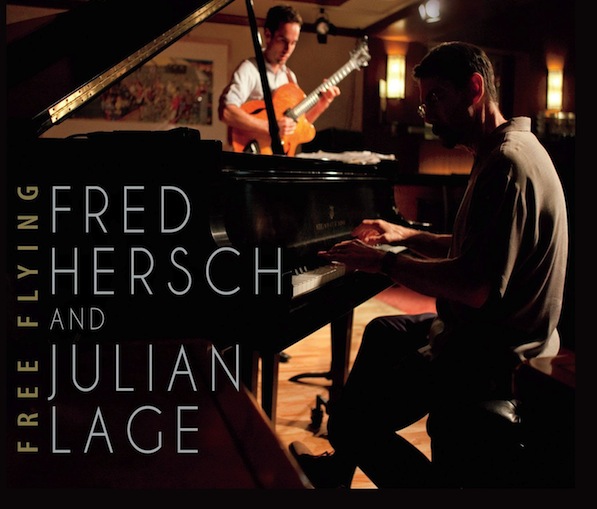Jazz Album Review: Fred Hersch and Julian Lage — Gloriously “Free Flying”
One of the remarkable aspects of these duets is that almost nowhere is either player — Fred Hersch or Julian Lage — reduced to mere comping.
Free Flying, Fred Hersch and Julian Lage (Palmetto Records 2768)
by Michael Ullman
This live date, filled with the nimble, lively, conversational playing of two masters, was recorded last February at Jazz at Kitano in New York City. Pianist Hersch, who teaches at the New England Conservatory and who has been nominated five times for Grammys, is well known to Bostonians. His young partner might be best known mostly to other guitarists. Born in 1987, and a professional since his early teens, Julian Lage has established himself as one of the most influential and innovative young guitarists alive. (His etudes and online instructional videos are assiduously studied.) He’s been a musician almost as long as he’s been alive. In his recent autobiography, vibist Gary Burton talks about hearing “a pre-teen guitarist” in a youth group sponsored by the Grammys. Sensing something remarkable about his playing, Burton called up the youngster, Lage, and they talked about “songs, harmony progressions, favorite records…all the usual musicians’ shop talk.” “The difference was,” Burton adds, “that I was talking to a twelve-year-old.” Three years later, Lage recorded with Burton on Generations. Now the guitarist, still in his twenties, is an impressive force.
Still, it’s Hersch who is in charge on Free Flying. There’s much to praise here, some of it almost invisible, such as the artfully seamless way in which Hersch ends a solo and at the same time prepares for Lage’s offering, or the way he echoes Lage’s statement of the second of his “Songs without Words.” It is not with standard comping, but with a flexible series of counter-statements, sometimes even doubling the melody.
Fred Hersch and Julian Lage will perform at Scullers Jazz Club in Allston, MA on November 21st.
The disc is also notable for containing seven delightfully varied Hersch compositions, ranging from the Bach-like opening duet to a spirited “Tango” in which the two somehow eschew the languid sensuality traditionally associated with that Argentinian dance. Hersch has written a sweet ballad “Heartland” and the folksy “Down Home,” which is dedicated to guitarist Bill Frisell, though it sounds to me like something by the pianist Abdullah Ibrahim. The two also play two jazz classics, Sam Rivers’ “Beatrice” and Thelonious Monk’s “Monk’s Dream.”
One of the remarkable aspects of these duets is that almost nowhere is either player reduced to mere comping. Given Hersch’s active, two-handed style, the textures can be dense: one barely hears Lage’s offerings in the first choruses of “Song Without Words: Duet,” yet when he emerges he seems to have been there all along. This is an especially alert collaboration: neither musician provides a bed for the other to lie down on. On the opening duet, one hears Hersch poking notes between Lage’s eloquent statements as if to remind the guitarist of his ever active presence. Yet they can also sound light-hearted, somehow implying stride on “Down Home” without precisely falling into its regular patterns. Here, in mid-solo, Lage ups the intensity intentionally with a heavily picked series of patterned phrases. Later he seems to back off with a rediscovered delicacy that Hersch instantly responds to. It’s Lage who states the melody of “Monk’s Dream.” Lage’s hesitations and Hersch’s almost stuttering commentary manage to make Monk seem even more eccentric then he is, and a lot more playful to boot. Still, it’s the variety and unerring charm of Hersch’s originals that may be the greatest draw of this set. Let’s hope there are many more such collaborations.
Michael Ullman studied classical clarinet and was educated at Harvard, the University of Chicago, and the U. of Michigan, from which he received a PhD in English. The author or co-author of two books on jazz, he has written on jazz and classical music for The Atlantic Monthly, The New Republic, High Fidelity, Stereophile, The Boston Phoenix, The Boston Globe and other venues. His articles on Dickens, Joyce, Kipling, and others have appeared in academic journals. For over 20 years, he has written a bi-monthly jazz column for Fanfare Magazine, for which he also reviews classical music. At Tufts University, he teaches mostly modernist writers in the English Department and jazz and blues history in the Music Department. He plays piano badly.

